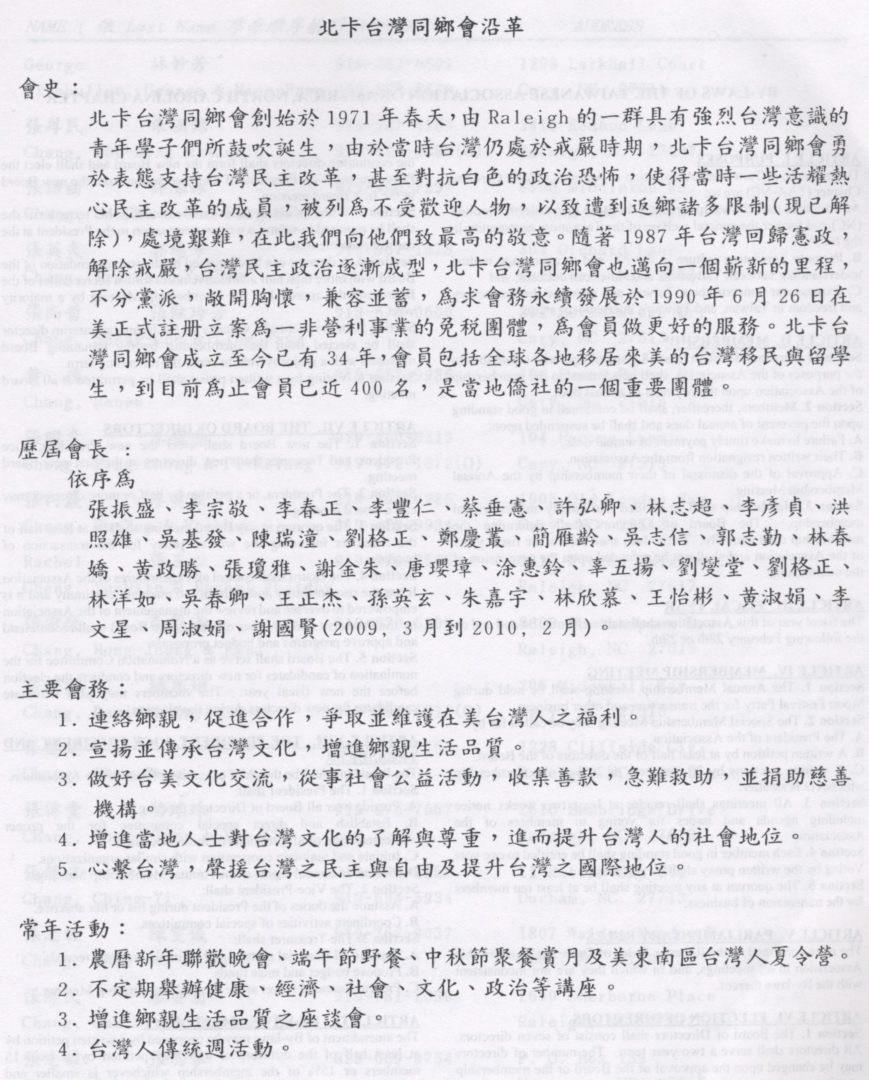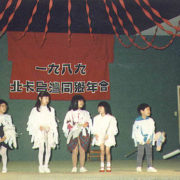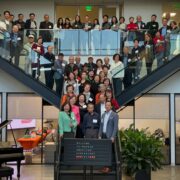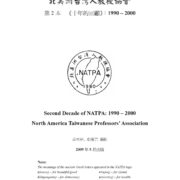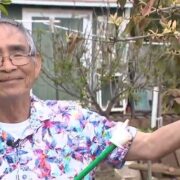Brief Introduction to the Taiwanese Association of America, North Carolina Chapter
Author: Chen-sheng Chang
Not long ago, my old friend, Brother Tsung-ching Li, called me and talked about how the newsletter of the Taiwanese Association of Raleigh, North Carolina, Taiwanese News, would be publishing its 100th issue in the beginning of next (96) year. Brother Li said that since I was the first Association President, I should write a testimonial. I feel extremely honored to be given this opportunity to participate in this historic issue of Taiwanese News. 1996 marks the 25th anniversary of the Taiwanese Association of America, Raleigh, North Carolina Chapter. The publication of this special issue this year is meaningful for a number of reasons.
I came to Raleigh in 1966. At the time, most of my fellow Taiwanese people were students, and since plane tickets home were expensive, we would all gather together to celebrate the Lunar New Year and other holidays. Very few people went home to celebrate the new year. Thus, Taiwanese students loved these holidays where we gathered to eat and talk. Not only were we able to share our feelings and relieve our senses of homesickness, it was also a good opportunity for us to cultivate the Taiwanese consciousness. Unfortunately, however, the Kuomintang government believed that the Taiwanese Association was a dissident group and paid close attention to the association’s activities on campus. This scared away a lot of people who wanted to attend our activities.
Around 1970, there was a group of Taiwanese in Raleigh with a very strong Taiwanese consciousness and the courage to stand up against the Kuomintang’s oppression. This group included individuals like Tsung-ching Li, Chun-cheng Li, and Chui-hsien Tsai. Chui-hsien Tsai had arrived earlier than everyone else, moving to Raleigh in 1970. He was a strong leader and advocated for the creation of a Taiwanese Association. In the spring of 1971, during a picnic held with a group of Taiwanese community members, the Taiwanese Association of North Carolina was officially established. The first president was also selected during this time, and I was very honored to be elected as the first president.
During my time in Raleigh, the Taiwanese Association held a lot of activities. The events that I have the deepest impression of occurred in 1972, the first being the time we invited Professor Lung-Chi Chen to NCSU to give a speech, and the second, our Mid-Autumn Festival Party. I remember that that year, NCSU had held an International Month, and students from various countries organized a number of different cultural and political activities on campus. With the help of a Mechanical Engineering professor, we received approval from the Dean of the Liberal Arts College to extend a speaker’s invitation to Professor Lung-Chi Chen via the school. I remember that the topic was “Taiwan, China, USA.” After Kuomintang students heard the news, they planned to make trouble on the day of the speech. This news reached the dean, and he was shocked; how could this kind of situation occur on a free campus? Thus, he scheduled a talk with the president of the Chinese student’s association and warned them that if anyone made trouble at the speech, they’d be expelled from the school. The dean’s warning was an effective deterrent against the Kuomintang students’ barbaric behavior. To garner a larger audience, especially one with more Americans, we put a lot of posters up around the campus. Since the publicity was good, there were hundreds of people who attended the speech, and the entire room was packed full. Professor Chen cited a number of examples that showed the situation of the Chiang dictatorship in Taiwan, and unreasonable decisions made by the Taiwanese parliament. Thanks to his eloquence and brilliant content, the speech was very successful. Many of the Taiwanese who were involved in this incident felt as though we’d won over the Kuomintang this time, and we were very happy.
In 1972, the Taiwanese Association intentionally held its Mid-Autumn Festival party on the same night as the Chinese student’s association’s party. I remember that it was held in the courtyard of a church on the east side of the campus. That night, we prepared music and lots of food and drink, and most of the Taiwanese students attended. Everyone had a great time. That night, a bunch of students got drunk, including myself. Since the majority of the students had come to attend our party, there were very few who attended the Chinese student’s association’s party, and the scene there was very cold and empty. The next day, a Kuomintang-affiliated student in my department complained, saying that the Taiwanese Association’s parties shouldn’t be held on the same day as the Chinese students association’s parties. When I heard this, I was very happy, because it meant that we had once again won over the Kuomintang. After this, the Chinese student’s association tried their best to avoid having their schedule conflict with the Taiwanese Association.
I left Raleigh and moved to Manhattan, Kansas (the location of Kansas State University) in 1978. This area cultivated a number of individuals who were very passionate about Taiwan in the earlier years (the 60s and 70s), and so, Manhattan is often referred to as the “Whampoa” of the Taiwan Independence Movement. The Raleigh area also bred a number of similar talents in the 1980s, so it should also be nicknamed the “West Point” of the Taiwan Independence Movement.
Raleigh is truly a place worth missing; if I have the opportunity, I will definitely return to see my old friends and visit the Taiwanese community there.
1979-80 The Taiwanese Association of America – North Carolina Chapter and the Founding of Taiwanese News
Author: Ken Lee
In 1979, I was “fortunate” enough to be elected as President of the Taiwanese Association. I say “fortunate” because as rumor had it at the time, the Taiwanese government was paying especially close attention to overseas residents. Those who had “bad physiques” or “ear problems” were often given “special protection.” And when they returned to Taiwan, they were allowed to enjoy “free food and housing.” If their “condition” was more serious, they might be sent to “Green Island University,” where they could pursue further studies. Thus, when I was elected as Association President, I was immediately promoted to “Taiwan’s Head of North Carolina” and ensured that my name was on the “Distinguished figures” list. At the time, I had just moved to Raleigh from the countryside, and had believed that receiving this promotion was an honor. Who would’ve thought that once I took office, I’d find that being the “head of a state” (zhouzhang) was worse than being the “head of a table” (zhuozhang). Not only did I have no staff or office, I didn’t even have a table or chair. In addition to budget of $200, I had only a dirty tea canister, a worn-out set of baseball equipment, and a volleyball. It was like being poorer than a beggar in a temple.
As the saying goes, “even a clever woman can’t cook without rice.” Willing to go all out, I turned this job of “State Head” (zhuozhang) into being a “Catcher” (zhuozhang), and I spend all day “catching people” and “capturing funds.” Liu Bei was able to convince Kong Ming to follow him after visiting him three times, but the people I was able to recruit all came unwillingly. This was because if things went badly, they would be forced to “heads cut off.” These talented people were worthy of “drinking ocean water,” because in a single moment they brought a formerly lifeless organization to life, so that it was as vigorous as “dragons and tigers.” We established a chorus (led by Chen-yang Chen), a small orchestra (Rui-tung Chen), a softball team (Ching-sung Wei), a volleyball team (Han-hsing Li), and published Taiwanese News. In the afternoons of nearly every weekend, we formed teams and went to the NC State court to play softball and volleyball. In the evenings, we gathered in the student dormitories to chat and joke around.
Our reach extended from the Triangle out to the entire state (from Greenville in the east, to Greensboro and Winston-Salem in the center, to Charlotte in the West). Moreover, our softball team even travelled to Tennessee and won several softball tournaments in the Southeastern United States.
As for the birth and growth of Taiwanese News, the newsletter went through a lot of difficulties and problems. There were no funds, and no one had publishing experience. Moreover, due to the political environment during that time, there were few who dared to openly come out and work on publicizing things, since they might get caught. Thus, the first few issues of Taiwanese News used a very relaxed and humorous tone to report news about Taiwan and discuss some basic concepts. In these issues, the more popular segments were “Brother A-Tsai and Sister A-Tsai,” a dialogue set filled with humor and metaphors. “Jean and James,” which told jokes in Taiwanese English, had some brilliant lines, including: “Don’t three eight (不要三八); no three no four friends (不三不四的朋友); seven morning eight morning, cry father cry mother (七早八早哭爹哭媽); people mountain people sea (人山人海).” “A Collection of Fools” introduced the Taiwanese community members who donated without expecting anything in return. “Third Uncle’s Lecture Hall” was dedicated to passing down the history of Taiwan. Once it was mentioned that the “liberation soldiers” and “receivers” purchased a water tap and stuck it in a wall. When no water came pouring out, they angrily returned to the shop and complained to the shop owner. This really provoked an outcry from the “readers”!
Taiwanese News later shifted from being a mild and funny publication to being a spicy and fierce publication that was filled with political fire. The Triangle also evolved from being a calm and obscure place to being the birthplace of the Taiwanese student movement in the US and a pilgrimage site for the Taiwan Democracy Movement. Both of these things were impacted by Taiwan’s trend towards democracy. The Formosa Incident on December 10th, 1979; the murder of Lin Yi-hsiung’s mother and daughters on February 28th, 1980; the murder of Chen Wen-Chen during his return to Taiwan on July 2nd, 1981; the North Carolina State University campus spy incident on 1981 (protagonists: Bei Hung Kuo and Kuo-ching Lin); and many other incidents naturally became the most important topics in Taiwanese News. Anyone who has lived in this area for a long time can bear witness to history, so I needn’t say more here.
On this occasion of congratulating Taiwanese News on her 100th issue, as someone who acted as the “midwife” in her birth, I sincerely wish that she will continue to grow to be even healthier and even more beautiful.
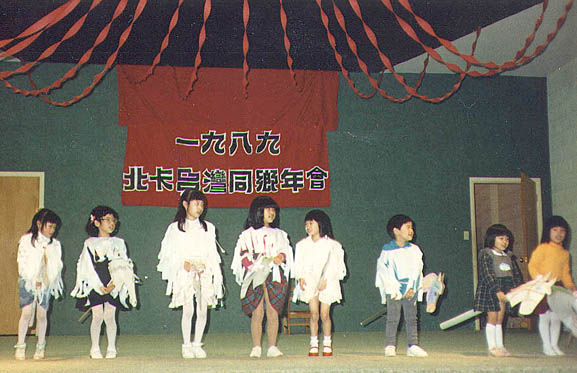
TAA-NC and Taiwanese Student’s Association Joint Lunar New Year’s Party, Raleigh, NC 02/04/1989
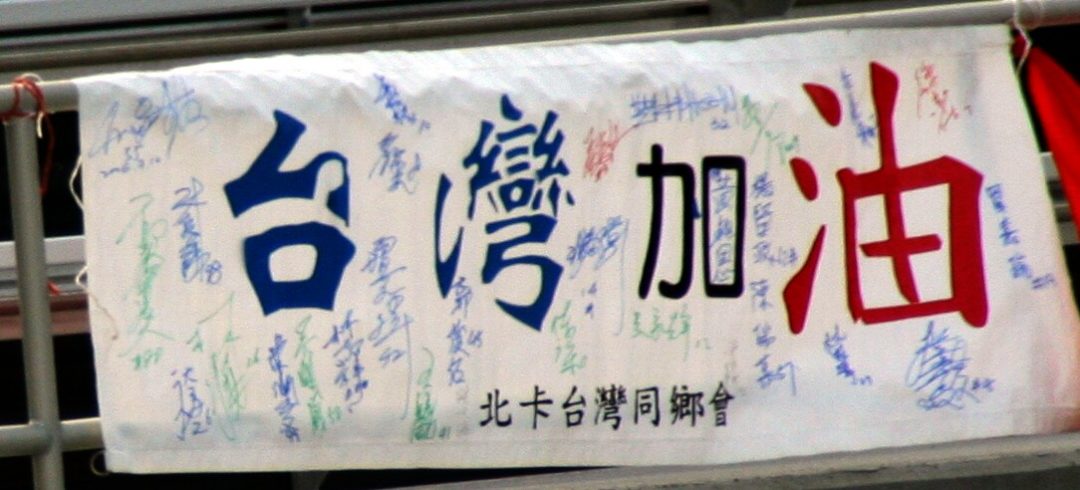
Signatures from Players on the Taiwanese Baseball Training Team 06/29/2006
Sourced from Taiwanese News 100th issue 01/1996 Taiwanese Association of America – North Carolina Chapter.
Translated from 39. History of Taiwanese Association of America Raleigh, NC Chapter 北卡台灣同鄕會簡介

